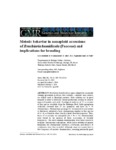Please use this identifier to cite or link to this item:
http://www.alice.cnptia.embrapa.br/alice/handle/doc/897402| Title: | Meiotic behavior in nonaploid accessions of Brachiaria humidicola (Poaceae) and implications for breeding. |
| Authors: | BOLDRINI, K. R.  ADAMOWSKI, E. V.   SILVA, N.   PAGLIARINI, M. S.   VALLE, C. B. do   |
| Affiliation: | K. R. BOLDRINI, 1Departamento de Biologia Celular e Genética, Universidade Estadual de Maringá; E.V. Adamowski, Departamento de Biologia Celular e Genética, Universidade Estadual de Maringá, Maringá; N. Silva, Departamento de Biologia Celular e Genética, Universidade Estadual de Maringá, Maringá; M.S. Pagliarini, Departamento de Biologia Celular e Genética, Universidade Estadual de Maringá, Maringá; CACILDA BORGES DO VALLE, CNPGC. |
| Date Issued: | 2011 |
| Citation: | Genetics and Molecular Research, v. 10, n.1, p. 169-176, 2011. |
| Description: | Brachiaria humidicola is a grass adapted to seasonally swampy grasslands in Africa; two cultivars, ?common? and Llanero, are widely used in Brazilian pastures. New cultivars are in great demand in order to diversify current production systems to achieve improved quality and yield. Cytological analyses of 55 accessions of this species available from the Embrapa Beef Cattle germplasm collection revealed that 27 are apomictic and have 2n = 54 chromosomes. Chromosome pairing as bi- to nonavalent associations at diakinesis indicated a basic chromosome number in this species of x = 6, as found in other closely related Brachiaria species. Thus, these 27 accessions are nonaploid (2n = 9x = 54). Abnormalities were found in the meiosis of these accessions, at variable frequencies. The most common abnormalities were those related to irregular chromosome segregation, which led to unbalanced gamete formation; but chromosome stickiness, cell fusion, and absence of cytokinesis were also recorded. Although some accessions have a low frequency of meiotic abnormalities, ensuring potentially good pollen viability, these cannot be used in hybridization due to a lack of sexual accessions with the same ploidy level. |
| Thesagro: | Brachiaria Humidicola Gramínea Forrageira Melhoramento Genético Vegetal Pastagem |
| Type of Material: | Artigo de periódico |
| Access: | openAccess |
| Appears in Collections: | Artigo em periódico indexado (CNPGC)  |
Files in This Item:
| File | Description | Size | Format | |
|---|---|---|---|---|
| gmr990.pdf | 803,05 kB | Adobe PDF |  View/Open |









